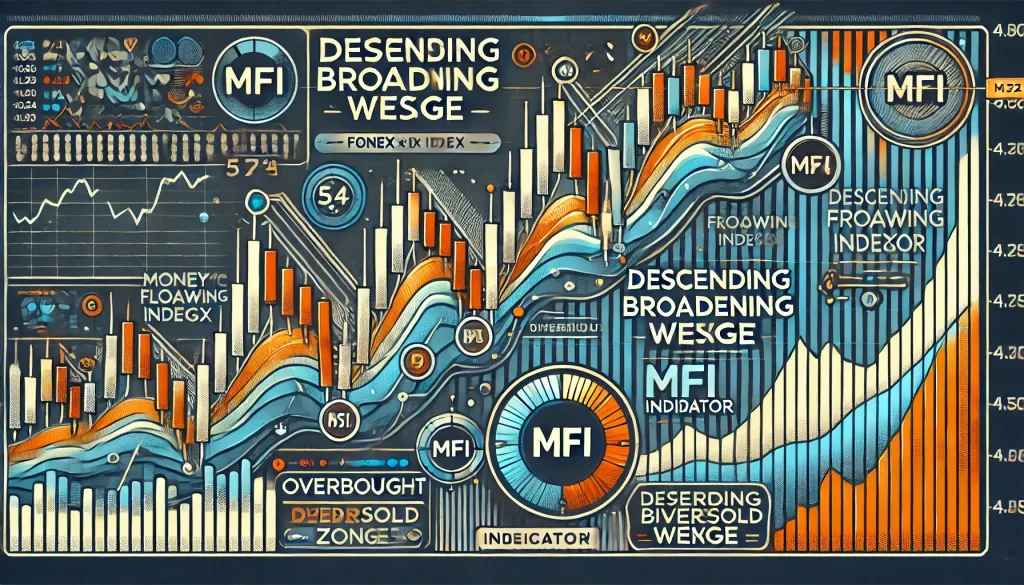Master Money Flow Index and Descending Broadening Wedge in Forex

The Hidden Profit Blueprint: Mastering the Money Flow Index and Descending Broadening Wedge
In the labyrinthine world of Forex trading, mastering advanced techniques can feel like finding a golden needle in a haystack. Enter two unsung heroes of technical analysis: the Money Flow Index (MFI) and the Descending Broadening Wedge. While these tools aren’t exactly A-list celebrities in the trading universe, they pack the kind of punch that can turn your trades into mic-dropping wins. Ready to dive deep? Let’s unpack the magic.
Why Most Traders Overlook These Tools (And Why You Shouldn’t)
First, let’s address the elephant in the room: why don’t traders use these tactics more often? The answer is simple—many prefer flashy indicators with catchy names. But ignoring the MFI and the Descending Broadening Wedge is like skipping leg day at the gym—you miss out on foundational strength.
The Money Flow Index: Your Market Mood Ring
Think of the MFI as the Forex market’s polygraph test. Unlike the RSI (Relative Strength Index), which solely measures price movement, the MFI adds volume to the mix, giving you a clearer picture of the market’s sentiment.
Here’s how it works:
- Overbought/oversold zones: MFI values above 80 scream “overbought,” while values below 20 signal “oversold.”
- Divergence detection: If the MFI shows a trend opposite to price movement, it’s waving a red flag about a potential reversal.
- Volume integration: By factoring in volume, the MFI highlights strength or weakness in price moves that other indicators might miss.
Example: Imagine trading EUR/USD. You notice the MFI has dipped below 20 while prices are consolidating. That’s your cue to prepare for a bullish reversal—like spotting a spring-loaded slingshot.
Descending Broadening Wedge: The Market Whisperer
If the MFI is your mood ring, the Descending Broadening Wedge is the market’s crystal ball. This chart pattern forms when price moves create a widening downtrend—lower highs and even lower lows. But here’s the kicker: it’s usually a bullish reversal pattern.
How to Spot It:
- Formation: Look for a downward-sloping pattern where the distance between highs and lows broadens over time.
- Breakout Potential: Once the price breaks above the resistance line, the market often skyrockets.
Pro Tip: Don’t just blindly enter when you see the breakout. Pair this with the MFI. For instance, if the MFI signals an oversold condition, the breakout’s likelihood of success shoots through the roof.
Putting It All Together: A Killer Strategy
Here’s a step-by-step guide to combining the MFI and Descending Broadening Wedge for maximum impact:
- Identify the Wedge: Use your favorite charting tool to spot a descending broadening wedge.
- Check the MFI: Look for values below 20 to confirm oversold conditions.
- Wait for Breakout Confirmation: Don’t jump the gun. Wait for a clear breakout above the resistance line.
- Set Your Entry Point: Enter the trade after a retest of the breakout level—think of it as dipping a toe before diving in.
- Risk Management: Use stop-loss orders below the wedge’s lowest point to manage risk effectively.
- Ride the Wave: Aim for a profit target based on the wedge’s height or trail your stop to lock in gains.
Real-World Example: In early 2023, GBP/USD exhibited a textbook Descending Broadening Wedge. Pairing this with an MFI reading of 18 resulted in a lucrative 150-pip rally post-breakout. Talk about cha-ching!
Common Pitfalls (And How to Avoid Them)
Even the best strategies can backfire if you’re not cautious. Here are some mistakes to dodge:
- Ignoring Volume Data: The MFI thrives on volume. Using it in low-volume markets is like bringing a butter knife to a steakhouse—ineffective.
- Premature Entries: Don’t let FOMO push you into trades before confirmation. Patience pays.
- Neglecting Risk Management: Without proper stops, even a winning strategy can lead to losses.
Why These Tools Are Your Forex Secret Sauce
Combining the MFI and Descending Broadening Wedge offers:
- Enhanced Accuracy: Volume-backed insights minimize false signals.
- Strategic Entry Points: Clearer breakouts mean better timing.
- Hidden Opportunities: Uncover trades other indicators might overlook.
By mastering these tools, you’re not just trading smarter; you’re trading ninja-smart.
Your Next Move
Forex trading isn’t about throwing spaghetti at the wall to see what sticks. It’s about precision, strategy, and staying ahead of the curve. The Money Flow Index and Descending Broadening Wedge aren’t just indicators; they’re your backstage pass to understanding the market’s deepest secrets.
Ready to elevate your trading game? Dive deeper into these strategies and more with our exclusive tools and resources:
- Latest Forex News: Stay ahead with real-time updates.
- Advanced Forex Courses: Master elite techniques.
- Community Membership: Join like-minded traders for daily insights.
- Smart Trading Tools: Optimize your strategies.
—————–
Image Credits: Cover image at the top is AI-generated
PLEASE NOTE: This is not trading advice. It is educational content. Markets are influenced by numerous factors, and their reactions can vary each time.

Anne Durrell & Mo
About the Author
Anne Durrell (aka Anne Abouzeid), a former teacher, has a unique talent for transforming complex Forex concepts into something easy, accessible, and even fun. With a blend of humor and in-depth market insight, Anne makes learning about Forex both enlightening and entertaining. She began her trading journey alongside her husband, Mohamed Abouzeid, and they have now been trading full-time for over 12 years.
Anne loves writing and sharing her expertise. For those new to trading, she provides a variety of free forex courses on StarseedFX. If you enjoy the content and want to support her work, consider joining The StarseedFX Community, where you will get daily market insights and trading alerts.
Share This Articles
Recent Articles
The GBP/NZD Magic Trick: How Genetic Algorithms Can Transform Your Forex Strategy
The British Pound-New Zealand Dollar: Genetic Algorithms and the Hidden Forces Shaping Currency Pairs
Chande Momentum Oscillator Hack for AUD/JPY
The Forgotten Momentum Trick That’s Quietly Dominating AUD/JPY Why Most Traders Miss the Signal
Bearish Market Hack HFT Firms Hope You’ll Never Learn
The One Bearish Market Hack High Frequency Traders Don't Want You to Know The

